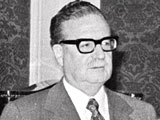
Echoes of the past and the lessons of history
Date: Wednesday, January 22 @ 22:21:26 UTC
Topic: Venezuela and Chavez
by Jim Reed*, for CBC News Online | Jan. 15, 2003
Venezuela in 2003 bears an eerie resemblance to the Chile I knew back in 1973.
Venezuelan President Hugo Chávez is accused by the country's business leaders and union bosses of politicizing the nation's main revenue-producing resource - oil - on which the United States depends. Venezuela is the world's sixth-largest oil producer and has traditionally supplied 10 to 15 per cent of U.S. oil needs.
Like then-president Salvador Allende of Chile, Chávez is a champion of the poor and has endorsed sweeping land reforms. He has issued presidential decrees that have been criticized by the land-owning and business communities. He's been friendly with Cuban leader Fidel Castro and has been openly critical of the United States and its dominant role in world affairs.
There is a loyal general defending Venezuela's democratically elected leftist president; there are other generals calling for his overthrow; there have been crowds of business-class demonstrators in the streets.

President Salvador Allende is shown in this Aug. 23, 1973 photo. (AP Photo/Enrique Aracena)
| Thirty years ago in Chile, the democratically elected leftist President Salvador Allende was accused of politicizing his nation's main revenue-producing resource - copper - an important commodity at the time. Copper doesn't quite compare with oil, but still, Chile was the main U.S. supplier. Allende's nationalization policy reminded the Americans of their arch enemy, Fidel Castro, and at the time that was a key factor in determining U.S. foreign policy.
Like Chávez in Venezuela, Allende alienated the land-owning and business class in his country by pushing forward with land reform. His policies destabilized the nation's economy, and just before his overthrow thousands of Chileans demonstrated in the streets calling for his resignation.
Like Chávez, Allende was friendly with Castro and critical of the United States. Allende's right to serve as president was defended by the loyal general, Rene Schneider, who insisted that the nation's constitution be respected.
The United States, angered by the nationalization of American-owned enterprises, offered covert assistance and money to plotters within the Chilean military. General Schneider, Allende's defender, was murdered, some say with covert assistance from the Central Intelligence Agency.
The Chilean president was confronted by an attempted military coup d'etat in the spring of 1973; that coup was thwarted and Allende remained in power for several more months. In September, the country's armed forces under the command of the rebellious General Augusto Pinochet attacked the presidential palace, assassinated the president and assumed control of the country. (A later government investigation found that Allende took his own life but that conclusion is widely doubted.)
The coup d'etat received a stamp of approval from American President Richard Nixon who strongly disliked Allende and his policies. It was later learned that the CIA had played an active role in undermining the Chilean economy and overthrowing the Allende government. In the months and years that followed, Chileans lived under a military junta that eventually ceded all power to Pinochet, whose iron-fisted rule lasted for more than 15 years.
Since the attempted coup by the Venezuelan military in April of 2002, the economy has deteriorated, street protests have intensified and people have been killed. Segments of the country's military are restive. U.S. Secretary of State Colin Powell has been publicly critical of President Chávez and the CIA warned that the country's "crisis atmosphere is likely to worsen." U.S. President George W. Bush has expressed his dislike of his Venezuelan counterpart and has refused to meet with him in private.
It's a measure of how the world has changed in 30 years that, while the Bush administration offered muted approval of the attempted coup, the White House and the State Department both later backed off. So far, there's no evidence of covert U.S. activity in Venezuela (although questions have been raised by Chávez supporters about the source of funds for the anti-Chávez movement.)
A number of U.S. officials have been at pains to clarify Washington's position. Pentagon spokeswoman Victoria Clark said: "We in no way support any coups or unconstitutional activity." White House Press Secretary Ari Fleischer told reporters: "The political situation in Venezuela is one for the Venezuelans to resolve peacefully, democratically and constitutionally, and we explicitly told opposition leaders that the United States would not support a coup." The Washington Times quoted a senior U.S. official as saying: "We didn't even wink at anyone."
Finally, while many of the circumstances are similar, the main difference between Hugo Chávez and Salvador Allende is the fact that Chávez is himself a former military officer. That military background and a more cautious United States could, in the end, save the Venezuelan leader from the fate of his Chilean counterpart, perhaps even till the next election.
Jim Reed has worked as a researcher, writer, producer, director, reporter and news anchor for CTV, TVO and CBC. He has travelled widely and has freelanced for The Associated Press, The New York Times, The Globe and Mail and other news organizations. He is now a news anchor for Newsworld International, and hosts the NWI documentary programme Up Close.
|
|